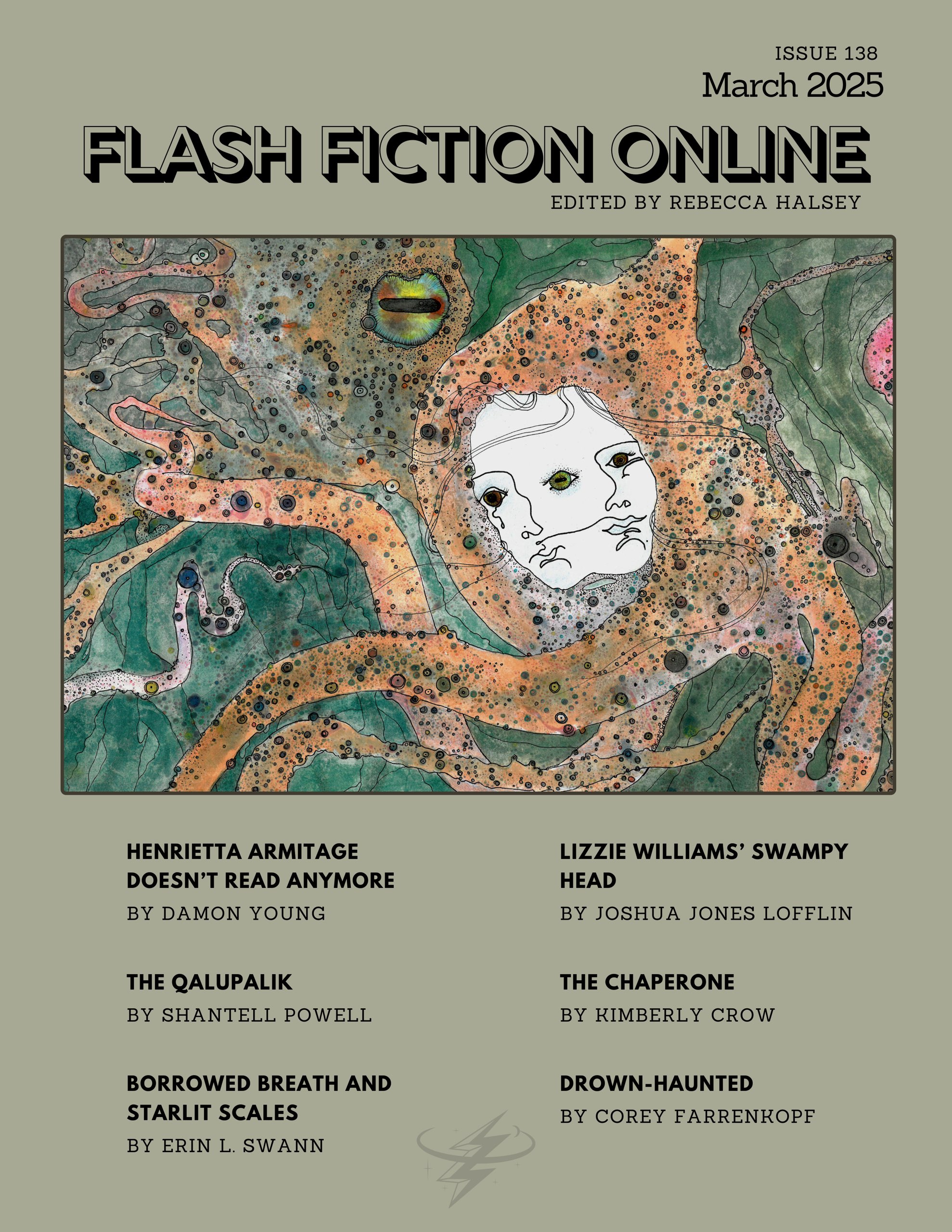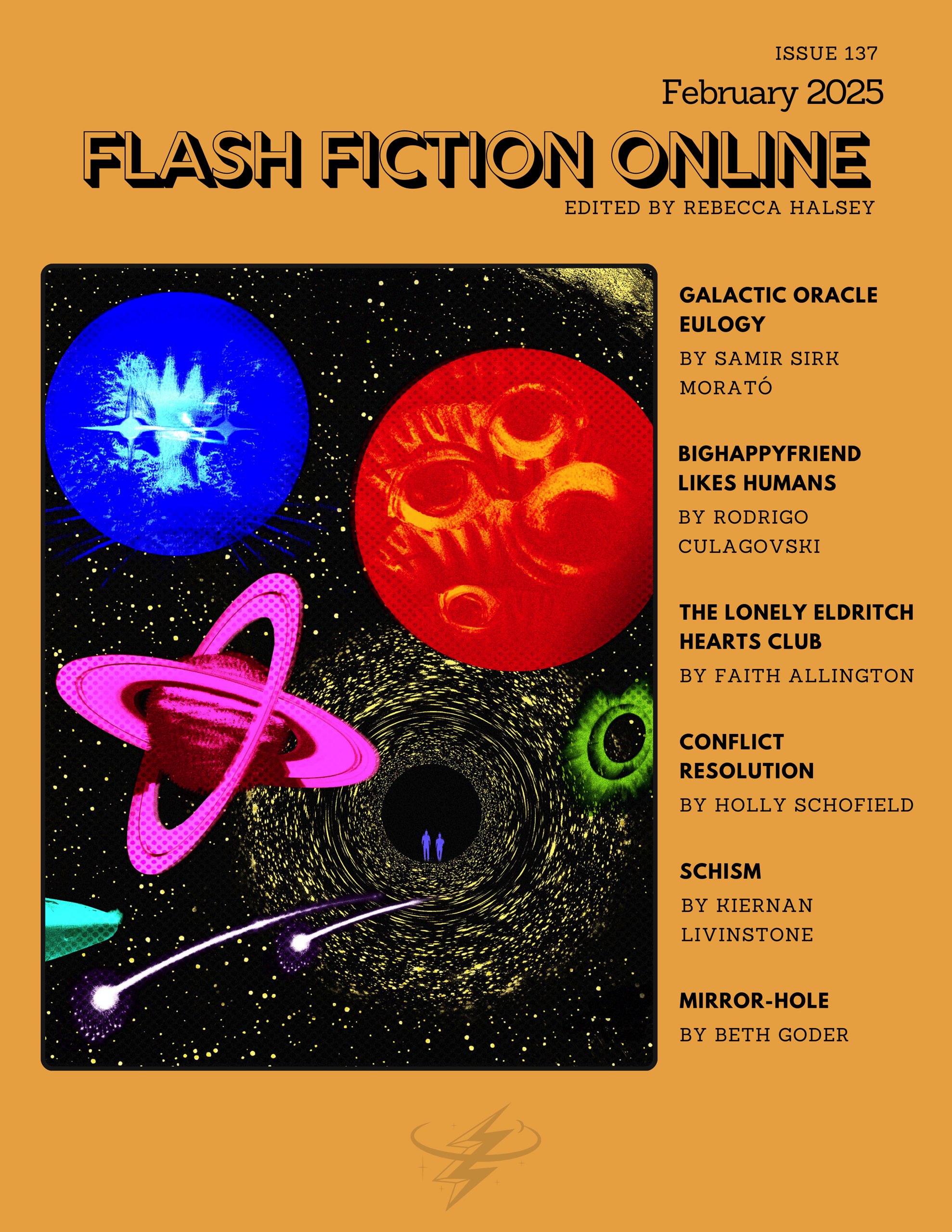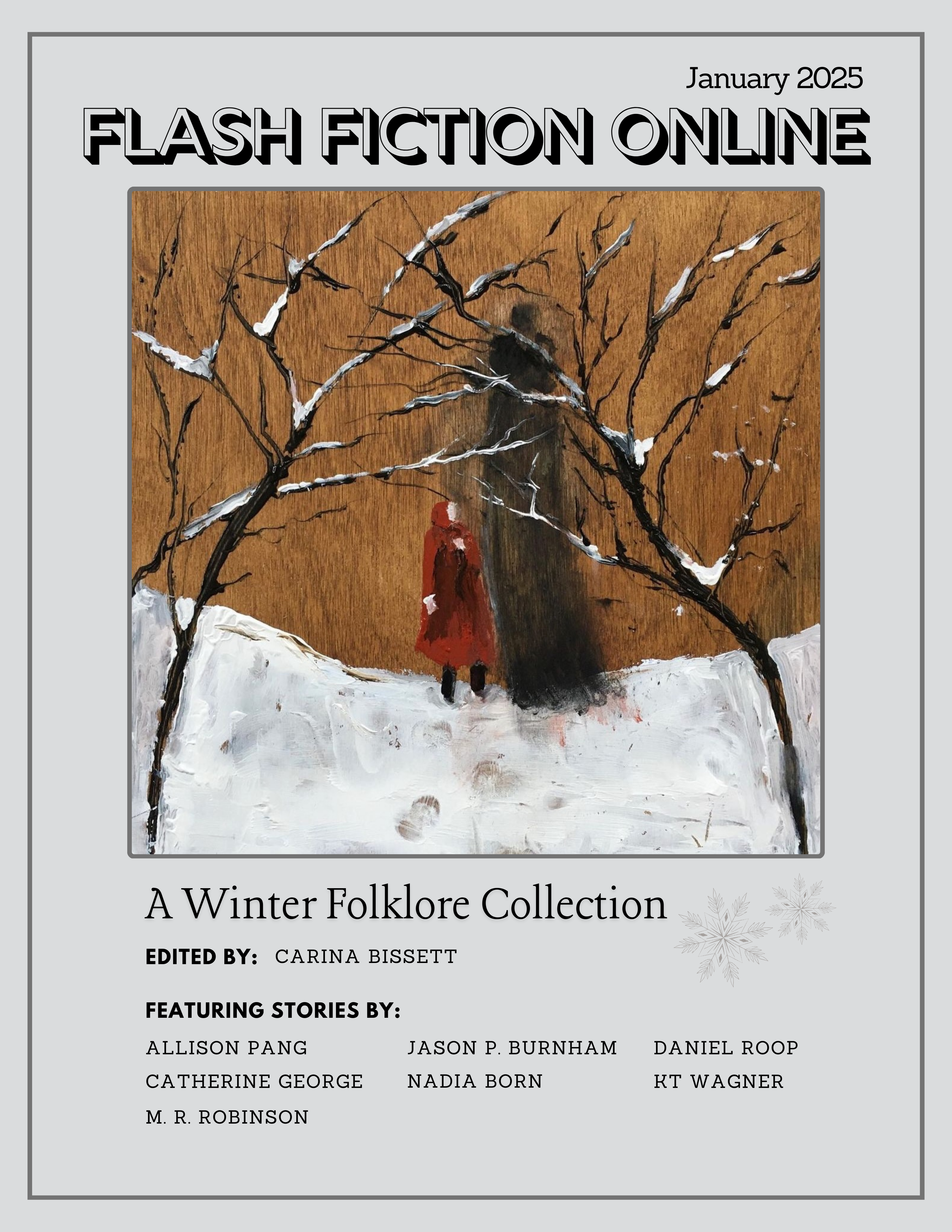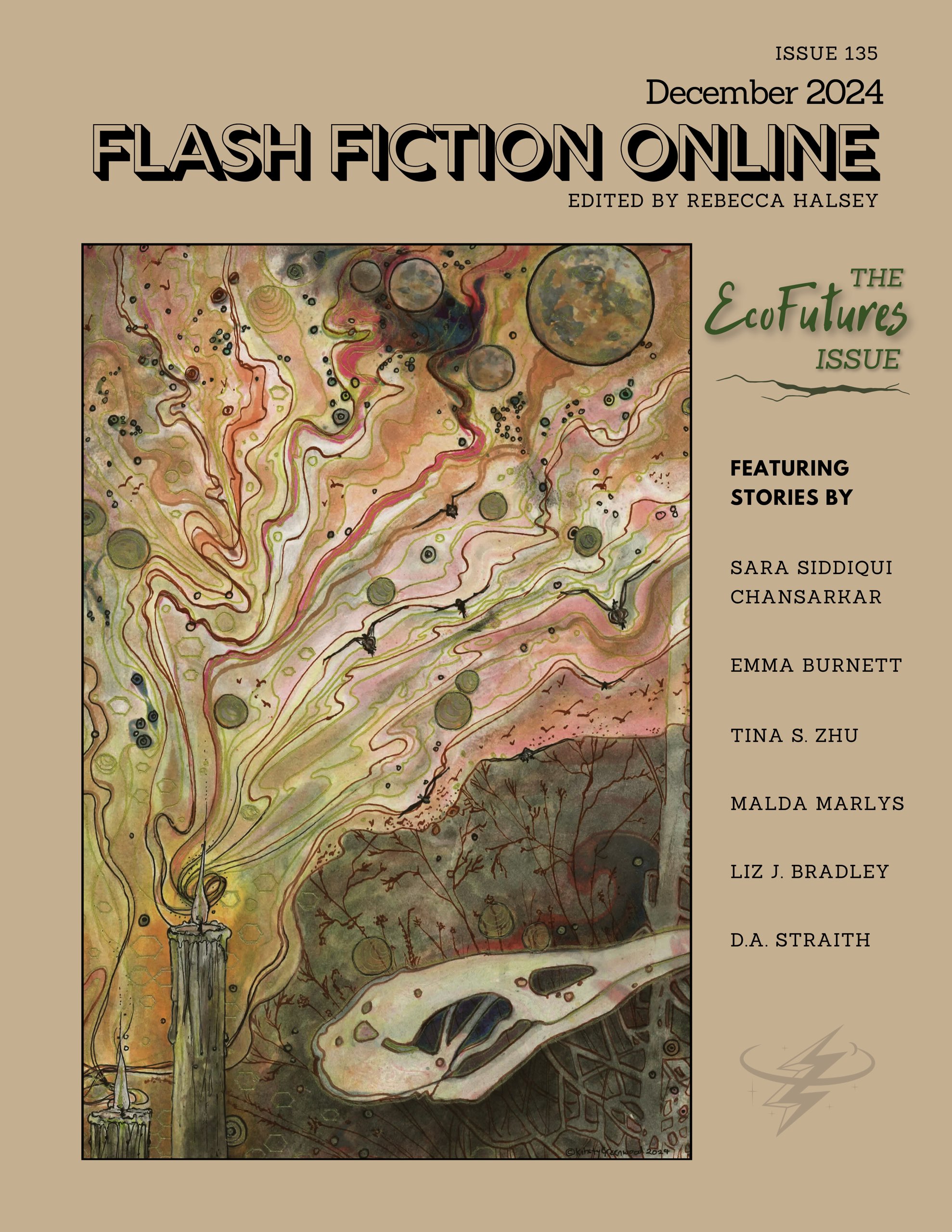BUY AN ISSUE
13 Tips for Writing Flash Fiction by Denise Ganley
So you want to learn to write flash fiction?
With these writing exercises and tips:
- Craft better short stories
- Get out of the slushpile
- Be accepted for publication
Today, I want to focus on some fundamental tips for writing flash fiction.
Cause it ain’t easy! For Flash Fiction Online, stories must be between 500 and 1000 words. Whew! Those are some tight restrictions, and that’s not a lot of space for your story. But as Shakespeare said, “Brevity is the soul of wit,” (Hamlet).
You can sum up flash fiction in that word, brevity. It’s critical to understand that flash is a unique medium, and it requires a different skillset than other storytelling formats.
Here are thirteen specific tricks (and a writing exercise) about how to write flash fiction (including insanely short stories).*
1. Take out all unnecessary words.
Practice on Twitter. I kid you not, and I speak from experience. Nothing shows you how to whittle down a sentence to the key elements better than Twitter. Pretend you only get one single solitary tweet to get the idea across. Can you do it?
Try this writing exercise and redo this sentence:
Pretend you only get one
singlesolitarytweet toget the idea acrossconvey your idea.
Pretend you only get one tweet to convey your idea.
Look, I just saved 3 words by editing that sentence. That’s GOLD in flash. It adds up, people!
2. You don’t need all those adjectives and adverbs.
Just use stronger nouns and verbs to do all the heavy lifting. For example, don’t say ‘walk leisurely’ when you can say ‘saunter’. Don’t say ‘small dog’ when you can say ‘Chihuahua’. Your specificity will build a better story with a smaller word count. The exception is for dialogue tags. You’re better off just using “said”, as other verbs related to speech tend to be distracting.
3. Pick a key emotion to color the story.
Readers love it when they feel something.
Caution: do not manipulate the reader with melodrama.
[melodrama: noun. a dramatic form that does not observe the laws of cause and effect and that exaggerates emotion and emphasizes plot or action at the expense of characterization.]
You’ve gotta earn those feels! And try ending in a different emotional place than where you start.
4. Pick a strong image.
Give us a meaningful and memorable visual. You want a movie example? Indiana Jones shoots the fancy swordsman in Raiders of the Lost Ark.
Or in the movie Se7en…the box opening scene!
Need a more recent example?
Miley Cyrus on a wrecking ball. Memorable.
Now do that with words.
5. Limit your number of scenes.
Honestly, one scene might be best. Otherwise, the world building and setting can take up too much word count. The key is choosing a small but powerful moment in a character’s life and placing your story there.
It’s the anti-epic story.
6. Speaking of characters, you don’t need more than one or two.
More than that and it gets dicey. Too much dialogue, too many interactions.
Twelve dancing princesses= suitable for a short story or novel.
One dancing princess= suitable for flash fiction.
Just say no to Character Clutter.
7. You’re better off using a 1st person or 3rd person limited points of view which stick tightly to the protagonist.
Pick just one point of view for a short story and utilize that throughout. Head hopping is particularly jarring in flash fiction. And avoid third omniscient, which also brings in too many points of view and character baggage for such a small space.
One character, one carry-on, no suitcases. Airplane metaphor, FTW!
8. Use a small idea.
Big ideas belong in BIG stories.
What’s the difference between a small idea and a big idea? The main difference is how you explore your concept. With a small idea, you keep it simple, and only probe one aspect with a very narrow, laser-type focus. Consider it tunnel vision. For a big idea, you get to dive into multiple aspects and complex bits in detail. Big ideas are more like a 360 degree panorama, there’s a lot happening. You know you have a big idea on your hands when it feels ripe with possibility, you’ll be reluctant to only spend that one moment in the world, and you’ll be imagining more themes, plots lines, and characters than I recommend here.
Big idea = “A civil war breaks out among several noble houses for the Iron Throne of the Seven Kingdoms.”
That’s A Game of Thrones by George R.R. Martin. Can you imagine this as a satisfying flash fiction piece? Not me. The indicators that this is big: “civil war” “several noble families” “seven kingdoms.” George R.R. Martin couldn’t even keep his idea(s) to one large book, because he had so much he wanted to explore!
Small idea = “A sentient bee microbot faces its demise and that of its companion bots.”
That’s “Death Comes for the Microbot” by Aimee Picchi. Check out her interview with FFO to see how she developed her story idea. What makes this one small? It jumps in right before the demise of the bots and ends right after. Do we need their origin story or the rest of the world after the bots are powered down for the last time? I don’t.
9. The same goes for a short story theme: you only have room for one.
Make it count, but don’t hit us over the head with it either.
A subtle theme is better than a hardcore one. Humans don’t respond well to stories that are more about a lesson than entertainment.
10. Focus on one main conflict.
Skip the subplots.
JK Rowling is a master of subplots. So if this were a Harry Potter flash, it would be stripped of everything else but the main conflict of Harry vs. Voldemort. Harry wouldn’t be involved with Cho, Hermione wouldn’t campaign to free the House Elves, Ron wouldn’t play Quidditch, Fred and George wouldn’t quit school to open a joke shop, and a million other things just wouldn’t fit.
11. Start in the middle of the story, at the beginning of the conflict.
Avoid backstory or prologue. And it’s best if you do not use flashbacks or flash forwards either. They don’t work as well in such a small space.
12. Make sure you have a character arc.
There’s nothing more disappointing than a character who doesn’t grow/change/learn. Sure, it happens, but does it make a fulfilling experience? Not particularly.
13. Choose an effective title.
First impressions help (or count, or whatever)! Let your title do some of the work, but don’t give away the story resolution with it either.
Titles that are spoilers are straight up from the Dark Side.
I challenge you to write twenty different titles for your next story. It’s a great writing exercise and future story idea generator. Chances are, the first ten will be tired and boring, but you’ll be forced to work past those and explore your story’s theme in new ways. Hopefully, by #20, you have a keeper.
There you have it–my lucky thirteen flash fiction tips.
Of course, these aren’t hard and fast rules, and there are plenty of great exceptions out there. But I’m confident that if you follow these aspects and the idea of brevity, you’ll have an easier time crafting a great flash fiction or short story.
If you use this guide, come back and tell us how it went.
Are there any rules you disagree with or am I missing anything mission-critical?
Don’t forget, writing in a new medium takes practice!
*Ok, for super insane flash stories, try reading some of the six-word stories on Twitter. @sixwordstories
To read our pet peeves, check out the things you should not do in your flash fiction submissions.
Support Flash Fiction Online
Flash Fiction Online is a free online magazine that pays professional rates. So how do we make that happen? It’s due to the generosity of readers like you.
Here are some ways you can help:
Become a Patron.
Sign up to become a monthly donor and gain access to exclusive Patron rewards like manuscript critiques, insider submission statistics, the Editors’ Wishlist, free downloads of our current issue, and Ask Me Anything chats with the FFO staff. Read more…
Subscribe to FFO.
Never miss an issue! E-reader formats delivered to your inbox. Available from WeightlessBooks.com
Buy our issues & anthologies.
Each of our issues and anthologies are available in convenient e-reader formats (epub/pdf). Available from the Flash Fiction Online Store and WeightlessBooks.
Donate.
Consider a one-time gift that fits your budget.
Spread the word.
Love one of our stories or articles? Share it with a friend!
LATEST NEWS

100th Issue Countdown: Issues 88-99 (2021)
As we wrap up our 100th issue countdown, let’s take a look at our most recent issues! And don’t forget, you still have until DEC 29 to place your votes for your 2021 favorites in the preliminary ballot for our very first FLASHY AWARDS! (Finalists in each category will be announced at our DEC 30 kaffeeklatsch!)Issue […]

100th Issue Countdown: Issues 4-15 (2020)
2020 was a tumultuous year, but here at FFO, we kept right on working, bringing you twelve more issues of brief, bold, and beautiful flash fiction! Issue #76 – January’s issue is one of New Year’s resolutions, where the characters in the stories make life-altering decisions. John Wiswell and Rebecca Birch both return in this issue, and Cathy Tenzo* […]








tamaramilesSC
October 12, 2016 @ 1:43 pm
Highly useful — thank you.
LarrySells
October 12, 2016 @ 4:44 am
I love all the 13 bits of advice. For me it’s the title that’s the hardest to come up with.
Nicole
September 16, 2016 @ 3:48 am
Hi! Thanks for the article, it’s very useful. I’m writing my first flash fiction as practice and my question is: Can a story that consists entirely of dialogue be considered as flash fiction (assuming it fits the word count)?
Anna Yeatts
November 1, 2016 @ 12:56 pm
Sure thing. It’s difficult to pull off, but it can be done.
Rob Powell
December 24, 2015 @ 7:14 am
Great article and interestingly point 13 I think should be number 1. This is because nobody is going to read you story unless they are grabbed by the title. And, amazingly enough this is one the vast majority of cases the author spends less time on.
Thanks,
Rob Powell
https://robpowellwrites.wordpress.com/
https://twitter.com/RobPowell64
Rob Powell
December 24, 2015 @ 7:12 am
Great article and interestingly point 13 I think should be number 1. This is because nobody is going to read you story unless they are grabbed by the title. And, amazingly enough this is one the vast majority of cases the author spends less time on.
Thanks,
Rob Powell
https://robpowellwrites.wordpress.com/
pennyjm21obpowell64
pennyjm21
July 10, 2015 @ 7:48 pm
Hi. I couldn’t find another way to reach you to tell you I was going to subscribe, but when I hit the “subscribe” button, I get -” A secure connection cannot be established because this site uses an unsupported protocol.”